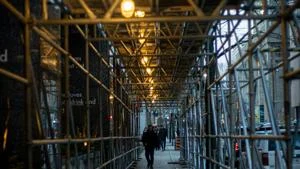The U.S. Chamber of Commerce is urging Congress to back a plan that would block New York’s “scaffolding” law, saying it’s driving up construction costs and wasting taxpayer dollars.
In an open letter to congressional lawmakers, U.S. Chamber Institute for Legal Reform’s President Stephen Waguespack called for passage of a bill filed by New York U.S. Rep. Nick Langworthy and other New York Republicans that would exempt federally funded projects from the Scaffold Law, which dates back to 1885.
He said the law “continues to impose absolute liability on property owners and contractors for gravity-related injuries on construction sites, regardless of a worker’s own negligence.”
“This makes New York the only state in the nation that does not utilize a comparative negligence standard, which would more fairly assign liability based on each party’s degree of fault,” he wrote.
Waguespack said passage of the Infrastructure Expansion Act of 2025 would put New York in line with the rest of the country to the benefit of construction site employers, taxpayers, and insurers.
“Specifically, the bill would prohibit states from applying an absolute liability standard on property owners and contractors for gravity-related injury claims on federally assisted or permitted infrastructure and transportation projects,” he wrote. “Instead, states would be required to impose a comparative negligence standard, and any conflicting state laws would be preempted.”
Langworthy said the mandate has caused construction insurance rates to skyrocket, driving up the cost of housing, schools, and infrastructure across the state. He said it also resulted in significant fraud as staged accident suits have flooded the courts.
“This bill is urgently needed to preempt this broken liability standard on federally funded projects and get New York building again,” Langworthy said in a recent statement. “New York’s Scaffold Law is a gift to trial lawyers and a burden on our construction workers and taxpayers, and it must change.”
Critics of the proposed changes have cautioned that restricting New York’s scaffolding law would make it harder for workers to recover damages, reverse safety gains and put workers at even greater risk of injury.
“By holding owners and contractors strictly liable for elevation-related hazards, the Scaffold Law creates a powerful incentive to invest in safety,” Leitner Varughese Warywoda, a New York City-based law firm, wrote in a recent report. “This preventative effect is credited with making New York’s worksites safer than they would be under a negligence standard.”
Langworthy’s proposal is backed by a litany of business groups, builders, and municipal officials who say the law has helped make New York one of the most expensive places to build in the country.
“When passed, it will help bring insurance carriers back to New York and make general liability coverage more affordable – allowing us to build more housing and repair our roads and bridges,” Brian Sampson, president of the New York chapter of Associated Builders and Contractors, said in a statement. “We look forward to working with the Congressman to get this much-needed legislation across the finish line.”






